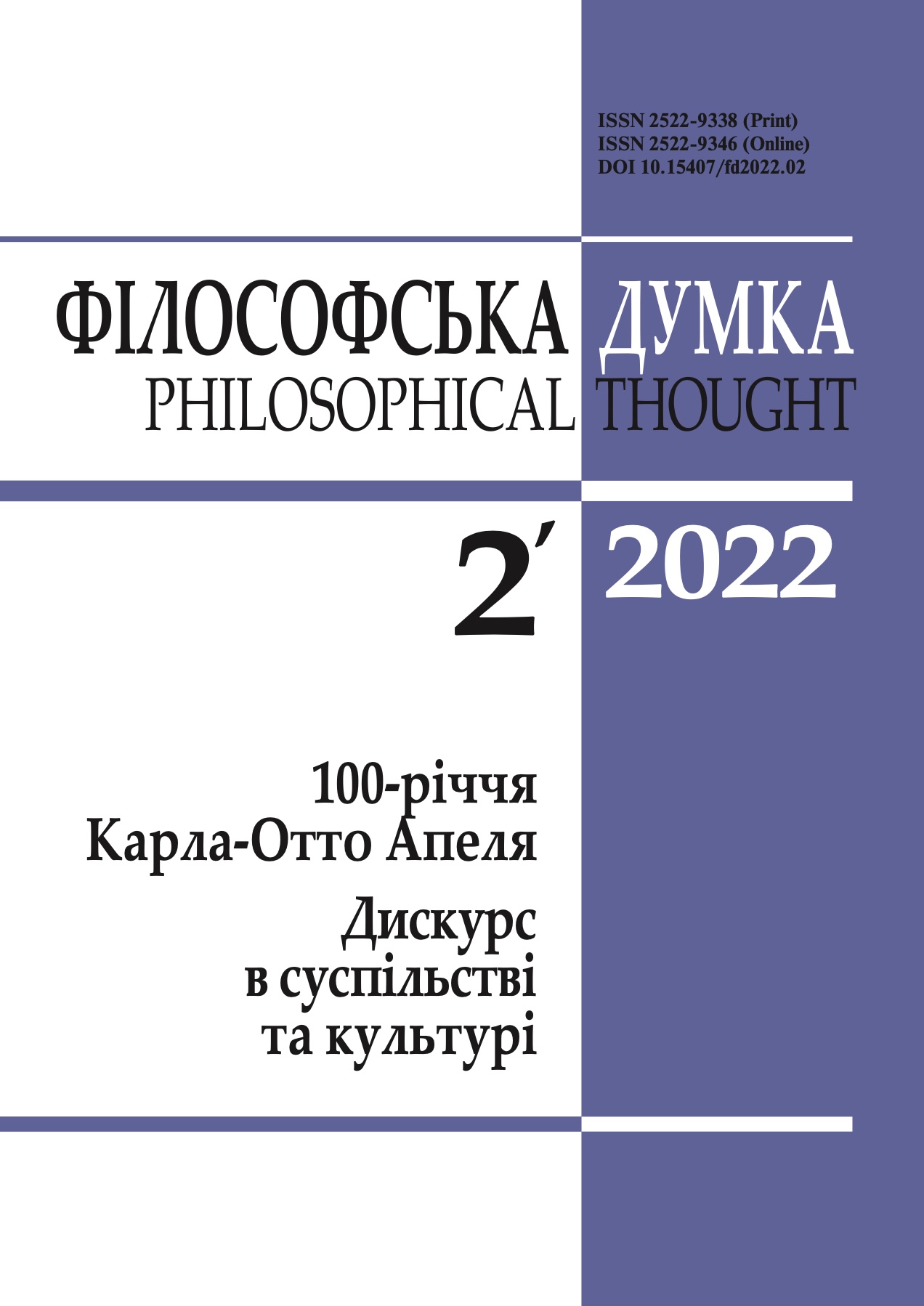ГЕРМЕНЕВТИКА НІЦШЕАНСТВА: АНАЛІТИКА РОЗМАЇТТЯ ІНТЕРПРЕТАЦІЙ ФІЛОСОФІЇ ФРИДРИХА НІЦШЕ КРІЗЬ ПРИЗМУ ЕВОЛЮЦІЇ ІДЕЙ ЕРНСТА ЮНҐЕРА
СТОРІНКА МОЛОДОГО НАУКОВЦЯ
DOI:
https://doi.org/10.15407/fd2022.02.178Ключові слова:
Ніцше, Юнґер, Надлюдина, Воля до влади, тотальна мобілізація, Робітник, ніцшеанство, герменевтика, інтерпретаціяАнотація
Сутність ніцшеанства як філософського вчення ніколи не характеризувалася певною сталістю чи визначеністю. Натомість «непрямі послідовники» та інтерпретатори філософії Фридриха Ніцше (позаяк прямих послідовників чи певної школи у цього мислителя не було) вдавалися до розмаїтого тлумачення його концептів. З огляду на це, герменевтичний аспект дослідження не лише текстів Ніцше, але і його інтерпретаторів, надає нам змогу по-новому поглянути на прихований потенціал концептів німецького філософа.
У цій розвідці ми прагнемо зосередитись на пошуках ніцшеанських коренів у творчій спадщині Ернста Юнґера, простеживши перетворення його ідей впродовж інтелектуального шляху автора та вказавши, наскільки описані нами переконання корелюють із думками самого Фридриха Ніцше та у чому проявляється їхня відмінність.
Як точку відліку будь-якого дослідження інтерпретацій філософії Ніцше автор виокремлює ту низку концептів німецького філософа, що перебуває на вістрі різнотлумачення. До таких центральних понять у статті відносяться уявлення про «аполонійне» та «діонісійне» начала (первні), антропологічну ідею «Надлюдини» та пов’язану між собою метафізичну тріаду «волі до влади», «переоцінки всіх цінностей» та «вічного повернення».
Окрім того, одним із провідних мотивів ХХ сторіччя, який можна простежити у спробі прочитати ніцшеанські ідеї, постулюється їхнє розташування на стикові філософських та політично-ідеологічних концептів. Аналізуючи ж своєрідний герменевтичний конфлікт ніцшеанської філософії, ґрунтований на цьому феноменові, автор звертається до ранніх спроб зрозуміти та реалізувати ідеї німецького мислителя, що їх здійснювали безпосередньо у Німеччині. Цей контекст пов’язується у статті з формуванням засад консервативної революції та постаттю Ернста Юнґера, позаяк інтерпретацію цього мислителя певною мірою можна вважати однією з перших та, безсумнівно, найбільш резонансною.
Посилання
unger, E. (2000). Worker Dominion and Gestalt. [In Russian]. In: E. Junger, Worker. Dominion and Gestalt; Total mobilization; About pain (pp. 5–40). St. Petersburg: Nauka. [=Юнгер 2000]
Junger, E. (2018). Gestalt change. Forecast for the 21st century. [In Russian]. Moscow: Tsiolkovskii bookstore edition. [=Юнгер 2018]
Junger, E. (2020a). Go away to the Forest. [In Russian]. Moscow: Ad Marginem. [=Юнгер 2020a]
Junger, E. (2020b). Fire and Motion (Mathematics of War). [In Ukrainian]. In: E. Junger, The Adventurous Heart (pp. 225–234). Kyiv: Publisher Anna Klokun. [=Юнгер 2020b]
Junger, E. (2020c). Total mobilization. In: E. Junger, The Adventurous Heart (pp. 235–254). Kyiv: Publisher Anna Klokun.
Nietzsche, F. (1997). Thus Spoke Zarathustra. Ware, Hertfordshire: Wordsworth Editions Ltd.
Nietzsche, F. (2018). Morning Dawn. Thoughts on moral prejudices. [In Ukrainian]. Kyiv: Tempora. [=Ніцше 2018]
Semeniaka, O. (2021). Ukrainian Jungeriana, conservative futurology, pan-Europeanism. [In Ukrainian]. Retrieved from: https://plomin.club/olena-semenyaka/.[= Семеняка 2021]
Siemens, H. (2006). Nietzsche contra Liberalism on Freedom. In: H. Siemens, A Companion to Nietzsche (pp. 437–454). Padstow: Blackwell Publishing Ltd.
##submission.downloads##
-
PDF
Завантажень: 330
Опубліковано
Як цитувати
Номер
Розділ
Ліцензія
Автори, які публікуються у цьому журналі, згодні з наступними умовами:
- Автори зберігають авторське право і надають журналу право першої публікації.
- Автори можуть укладати окремі, додаткові договірні угоди з неексклюзивного поширення опублікованої журналом версії статті (наприклад, розмістити її в інститутському репозиторії або опублікувати її в книзі), з визнанням її первісної публікації в цьому журналі.
- Авторам дозволяється і рекомендується розміщувати їхню роботу в Інтернеті (наприклад, в інституційних сховищах або на їхньому сайті) до і під час процесу подачі, так як це може привести до продуктивних обмінів, а також скорішого і ширшого цитування опублікованих робіт (див. вплив відкритого доступу).


